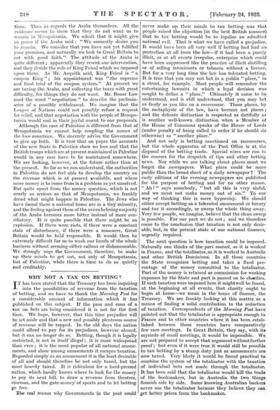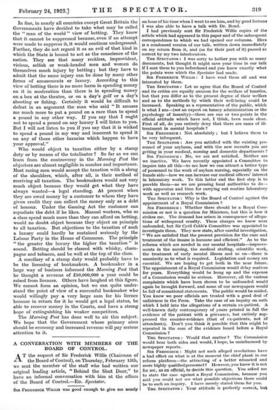WHY NOT A TAX ON BETTING ?
IT has been stated that the Treasury has been inquiring into the possibilities of revenue from the taxation of betting, and we have to thank the Morning Post for a considerable amount of information which it has published on this subject. If the pros and cons of a tax on bets are being considered it is not for the first time. We hope, however, that this time prejudice will be set aside and that a new and possibly plenteous source of revenue will be tapped. In the old days the nation could afford to pay for its prejudices, however absurd, but it can no longer do so. Betting, though it is legally restricted, is not in itself illegal ; it is more widespread than ever ; it is the most popular of all national amuse- ments, and alone among amusements it escapes taxation. Regarded simply as an amusement it is the least desirable of all and should therefore be not only taxed, but the most heavily taxed. It is ridiculous for a hard-pressed nation, which hardly knows where to look for the money to pay its next bill, to draw a revenue from theatres, cinemas, and the gate-money of sports and to let betting go free.
The real reason why Governments in the past could never make up their minds to tax betting was that people raised the objection (in the best British manner) that to tax betting would be to legalize an admitted national evil. That is what we have called a prejudice. It would have been all very well if betting had had no protection at all from the law—if it had been a purely illicit, or at all events irregular, enterprise which could have been suppressed like the practice of illicit distilling or of selling intoxicants or tobacco without a licence. But for a very long time the law has tolerated betting. It is true that you may not bet in a public " place," in a street, for example. Most people will remember the entertaining lawsuits in which a legal decision was sought to define a " place." Ultimately it came to be understood, and is still understood, that you may bet as freely as you like on a racecourse. Those places, by the metaphysic of the law, have become not places ; and the delicate distinction is respected as dutifully as is another well-known distinction when a Member of the House of Commons speaks of the House of Lords (under penalty of being called to order if he should do otherwise) as " another place."
And not only is betting sanctioned on racecourses, but the whole apparatus of the Post Office is at the disposal of the betting trade. Special wires are run to the courses for the despatch of tips and other betting news. Nor while we are talking about places must we forget the newspapers. What place could be more public than the broad sheet of a daily newspaper ? The early editions of the evening newspapers are published for the purpose of betting and for no other reason. " Ah I " says somebody, " but all this is very sinful, and we must not make money out of sin." To our way of thinking this is mere hypocrisy. We should either accept betting as a tolerated amusement or luxury and tax it accordingly, or sweep the whole thing away. Very few people, we imagine, believe that the clean sweep is possible. For our part we do not ; and we therefore come to the conclusion that taxation is not only desir- able, but, in the present state of our national finances, urgently required.
The next question is how taxation could be imposed. Naturally one thinks of the par% mutuel, as it is worked in France, and the totalisator, as it is worked in Australia and other British Dominions. In all those countries the State recognizes betting and takes a fixed per- centage of the money committed to the totalisator. Part of the money is retained as commission for working expenses by the State and part is passed on to charities. If such taxation were imposed here it mightwell be found, at the beginning at all events, that charity ought to begin at home—we mean in the home of finance, the Treasury. We are frankly looking at this matter as a means of finding a solid contribution to the reduction of taxation. Correspondents of the Morning Post have pointed out that the totalisator is appropriate enough to France and to other countries where it has been estab- lished because those countries have comparatively few race meetings. In Great Britain, they say, with its myriads of small meetings, it would be impossible. We are not prepared to accept that argument without further proof ; but even if it were true it would still be possible to tax betting by a stamp duty just as amusements are now taxed. Very likely it would be found practical to combine the system of the totalisator with the taxation of individual bets not made through the totalisator. It has been said that the totalisator would kill the trade of the bookmakers, but in Australia the two things flourish side by side. Some knowing Australian backers never use the totalisator because they believe they can get better prices from the bookmaker. In fine, in nearly all countries except Great Britain the Governments have decided to take what may be called the " man of the world " view of betting. They know that it cannot be suppressed because, even if an attempt were made to suppress it, it would continue underground. Further, they do not regard it as an evil of that kind in which the State is bound to act as the conscience of the nation. They see that many reckless, improvident, vicious, selfish or weak-headed men and women do themselves much injury by betting ; but they have to admit that the same injury can be done by many other forms of amusements or luxury. According to this view of betting there is no more harm in spending money on it in moderation than there is in spending money on a box at the theatre, or on a day's golf or a day's shooting or fishing. Certainly it would be difficult to defeat in an argument the man who said " It amuses me much more to put a pound on a race than to spend a • pound in any other way. If you say that I ought not to spend a pound on any luxury I will listen to you. But I will not listen to you if you say that it is wicked to spend a pound in my way and innocent to spend it on any of those other luxuries which happen to have your approval."
Who would object to taxation either by a stamp duty or by means of the totalisator ? So far as we can learn from the controversy in the Morning Post the objectors are almost negligible in number and importance. Most racing men would accept the taxation with a shrug of the shoulders, which, after all, is their method of receiving all taxation. The bookmakers would not very much object because they would get what they have always wanted—a legal standing. At present when they are owed money by a customer to whom they have given credit they can collect the money only as a debt of honour. Under the Gaming Act the customer can repudiate the debt if he likes. Manual workers, who as a class spend much more than they can afford on betting, would no doubt object because they object on principle to all taxation. But objections to the taxation of such a luxury could hardly be sustained seriously by the Labour Party in the House of Commons. The principle " the greater the luxury the higher the taxation " is sound. Betting should be classed with whisky, cham- pagne and tobacco, and be- well at the top of the class.
A corollary of a stamp duty would probably have to be the licensing of bookmakers. A bookmaker in a large way of business informed the Morning Post that he thought a revenue of £10,000,000 a year could be raised from licences. Others have laughed at this figure. We cannot form an opinion, but we can quite under- stand the point of view of a successful bookmaker who would willingly pay a very large sum for his licence because in return for it he would get a legal status, be able to recover money in the Courts, and have a strong hope of extinguishing his weaker competitors.
The Morning Post has done well to air this subject. We hope that the Government whose primary aims should be economy and increased revenue will pay serious attention to it.











































 Previous page
Previous page